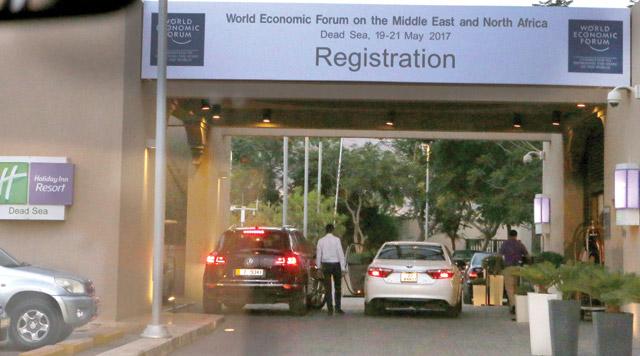You are here
WEF concludes by highlighting Jordan’s ‘big role’ in initiatives
By Mohammad Ghazal - May 21,2017 - Last updated at May 21,2017
DEAD SEA — The World Economic Forum (WEF), which witnessed several discussions on pressing regional issues and the launch of several programmes and initiatives, concluded at the Dead Sea on Sunday.
Speaking during the last session of the forum, Mirek Dusek, head of the forum's regional strategies, said: "We launched two big initiatives in Jordan. Jordan is playing a very big role in Internet for All, which is looking at the digital infrastructure in Jordan and among Syrian refugees.
“We also launched a new partnership called the Sustainable Development Initiative partnership where Jordan is becoming the regional hub for enabling blended finance for infrastructure projects."
"We had an amazing meeting of global shapers who are people under 30 doing amazing things in their own environments…we also had dialogue between Palestinian, Israeli and Arab leaders on the Israeli and Palestinian dialogue and many other initiatives," Dusek stated.
The forum, he said, witnessed diverse participation from many countries.
Prime Minister Hani Mulki deputised for His Majesty King Abdullah at the conclusion of the forum, where HRH Prince Feisal was present.
More than 1,200 business and political leaders as well as representatives from civil society and international organisations, youth and the media from over 60 countries participated in this year’s forum, held under the theme “Enabling a Generational Transformation”.
A major outcome of the 2017 World Economic Forum on the Middle East and North Africa included the participation of 100 Arab start-ups.
Most of the 100 start-ups are building their business models, products and services on new technologies such as artificial intelligence, blockchain and satellite technology — pioneering a generational transformation in the Middle East and North Africa — while closing region-specific gaps in products and services.
A new report titled “Future of Jobs and Skills in MENA: Preparing the Region for the Fourth Industrial Revolution”, was also launched. It found that few MENA economies are fully prepared for the impending disruption to jobs and skills brought about by technological change.
Jordan became the 36th member of the Sustainable Development Investment Partnership (SDIP), a multistakeholder platform promoting blended finance to unlock financing for sustainable infrastructure projects in developing countries.
The first meeting of the SDIP MENA Hub brought together a core group of regional institutions to promote greater financing of projects throughout the region.
The meeting saw the launch of the Palestinian Education Trust, a $100-million fund to transform the Palestinian education system, with $10 million already committed.
WEF and Jordan officially launched the Jordan Internet for All project while the Centre for Economic Growth, INSEAD and Google released the MENA Talent Competitiveness Index.
Diversifying the economy, reducing public intervention in the markets, providing opportunities to young people and improving the innovation ecosystem were listed as the key challenges that the region will face in the coming years. They will be the subject of further research that will be conducted jointly with the World Bank Group in preparation of the Arab World Competitiveness Report 2017.
Related Articles
AMMAN — His Majesty King Abdullah will on Saturday open the World Economic Forum (WEF) on the Middle East and North Africa at the Dead
AMMAN — The intricate issues and challenges facing the Middle East and North Africa’s (MENA) population of more than 400 million people, ran
AMMAN — More than 1,000 leaders of government, business, civil society, faith and academia from across the world will take part in the 17th














